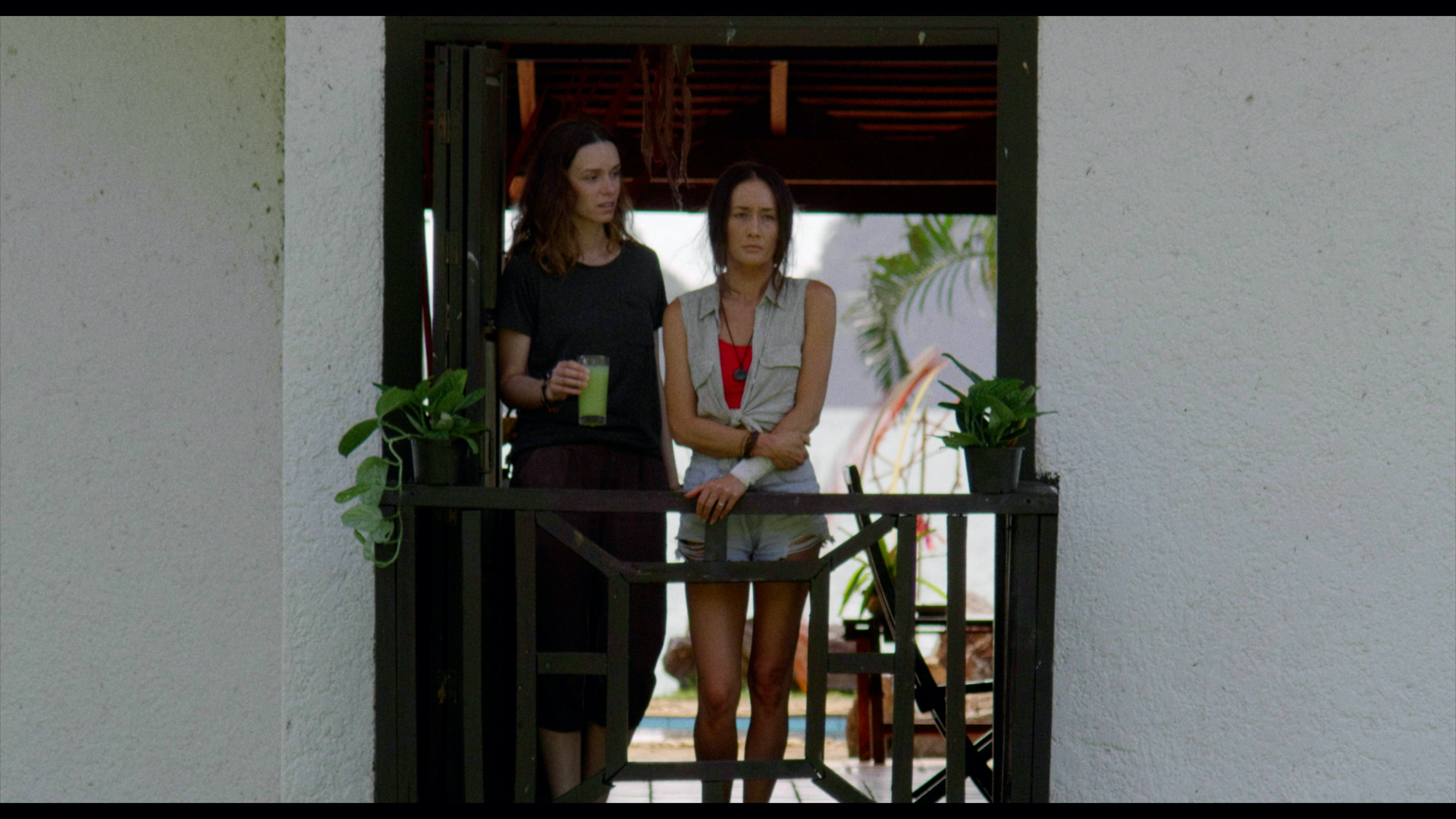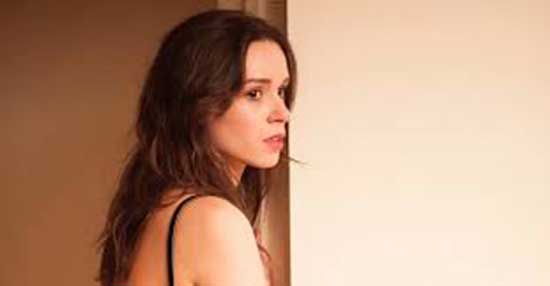‘Death Of Me’ star Alex Essoe talks about playing Ruth Gordon in 'Rosemary’s Baby’
The 'Death Of Me' actress reflects on playing complex female characters whose positivity masks deadly secrets.

This interview contains spoilers for Death of Me.
After decades of damsels in distress, victims waiting for an axe or cleaver, and final girls facing off against unimaginable evil, actresses have recently enjoyed a renaissance of roles in horror where they play characters as complex, mysterious, and even dangerous as their male counterparts. As both a beneficiary and advocate for this trend, Alex Essoe has played some fascinating women in the likes of Starry Eyes, Midnighters, Doctor Sleep, and Homewrecker, which she also wrote and produced. And in Death of Me, opening October 2, she further tests audiences’ understanding, and sympathies, playing Samantha, a young mother shepherding an American tourist named Christine (played by Maggie Q) through a lush but foreign landscape on an island in Thailand where she discovers she’s experienced an unbelievable act of violence, but has no memory of it.
Essoe recently spoke to What To Watch about her role in the film, a guide for both the American tourists and the audience, whose motives are not only unclear but may in fact carry deadly consequences. In addition to talking about the ambiguity she brought to Samantha while developing the character with director Darren Lynn Bousman (Abattoir), Essoe discusses the mechnisms she uses for her deceit, the concern and even feminist solidarity of her actions, and the motives that drive her to push Maggie Q’s character towards the film’s fateful climax. Finally, she reflects on her own understanding of - and susceptibility to - cult worship, and reveals some of the instincts and basic needs that drive her to repeatedly choose roles in horror-themed projects.
With so few English-speaking characters, how did you initially see your character’s role in Death Of Me?
Alex Essoe: Darren and I together kind of had to start from scratch because initially the part was written for a woman in her mid-forties. But the casting director brought me in and put me on tape for it anyway and they decided to cast me instead. So we had to start with a completely new backstory from scratch to justify my relationship with this girl who's meant to be my daughter. So that was really fun. We shot this in Thailand and there are quite a few American expats living there, and I tried to kind of tap into the way that Americans tend to romanticize that part of the world - “island living” and it's so pretty and it's so easy. So it was very odd that she's just living there in that little tiny community and she's the only American on the island. There's something unnerving about that. So I wanting to bring a kind of backpacker, trustafarian feel to her.
Because of the way that the main characters are feeling their way through what's happening, did you see her to some extent as a guide in story, or what was the role you were playing in this mystery?
Essoe: It's interesting that you say that because I am a guide in a way it, not necessarily for the benefit of the main characters, but I am guiding her toward something that has more to do with my own agenda. So I am the guide, but that in itself is a red herring, which I thought was cool about that part to begin with. She's not just a straight villain. She really lulls Maggie Q’s character into a false sense of security, which was really fun to play.
The latest updates, reviews and unmissable series to watch and more!
We’re introduced to this character when she's basically intruding on the discovery that these two people have made about their night and Luke's character says, “she's fine.” And you say, “I'd like to hear her say that,” which feels like a very supportive thing to say. In the course of that collaboration with Darren, were there specific ways you wanted infiltrate the audience’s expectation of being a support system for this female character while at the same time lulling her into a false sense of security?
Essoe: Women supporting women, right? It's very convenient thing to hide behind. It's very easy to put people at ease if you make them feel as if you have an extra interest in their care and their feelings. So there are a lot of moments that are so seemingly tender - I want to hear her tell me that she's okay, establishing that she can trust me and all of this. I'm always making her smoothies, something to drink. I remember Darren talking about how we wanted this character to feel kind of like Ruth Gordon's character from Rosemary's Baby. You know, just a kindly neighbor who's helping her out and is really concerned for her - and is feeding her constantly. And like Ruth Gordon, because she's brilliant in that movie, I really wanted it to be very downplayed where I'm almost as confused as she is about all these things that are going on. Which makes it more sinister because I've done this before, a few times.
How many of those layers as an actor do you think about - ‘this is what I'm doing to trick her’ versus in the moment being sincere, since there are multiple levels at which those choices have to work for the story?
Essoe: There are a lot of moments that start to take on a double meaning, like my concern for her wellbeing can easily translate to ‘I'm worried she's not going to go to the place I want her to go to.’ But to the audience, hopefully until my true danger is revealed, I'm just as lost as you are, getting dragged along this crazy thing. It was really fun because when the mask finally does slip, it's not like a Dr. Jekyll/ Mr. Hyde thing where I'm all nefarious underneath. It's almost kind of sad actually, because Sam is very much the victim of her belief systems. It's not like she likes hurting people. She just believes so much in the cult and the cause that it's all justified.
One of the things that honestly felt the most unsettling was how your character's child is always with you, which ordinarily would be a comforting thing. And I'm curious how you Maggie, but also Darren and the young actress who plays your daughter defined what those moments would be like, because it's an unsettling level of normalcy in a circumstance that for Maggie is very traumatic.
Essoe: Again, it's that red herring of extra support. My daughter and I are here for you. But I don't have a very warm relationship with my daughter. At one point she calls me by my first name, and I'm like, “call me Mom.” I have to remind her. We don't have a very affectionate relationship. She's just always there, like an extra guard or an extra pair of eyes. And the young actress, it was her first movie. This is her first her first American project. But she was really delightful. I don't know how much of the intricacies of the story were made an impression on her. I think for her, it was more a matter of ‘this is a scene where Maggie needs your help’, or ‘this is the scene where she needs you to tell her the truth’. Because especially with kids, you can't come at them with, ‘in this scene, your character is feeling this, but you're going to play this instead on top to cover that up.’ Kids don't do that. Adults do that. But she was really fun to work with.

When you're telling a story like this, how important is it for you to know and understand every aspect of the mythology? Do you need to know every aspect going into it, or is it more important for you perhaps to be just present in the moment, without worrying about the overall either story or mythology that may yet not even be revealed?
Essoe: My philosophy has always been ‘I should know as much as my character knows,’ so whatever she knows about the cult is what I know about the cult. I actually did a ton of research because there are a lot of aspects of the mythos in this movie that are based on real things, and real Thai voodoo practices as well. Like there are some rural towns where it was a superstition to make human sacrifices, and they have found the corpses of pregnant women. And what's interesting is that a lot of the time, those sacrifices were willing, they volunteered because it was considered a great honor to give your life to protect your village. And my character even talks about that in the movie that it's an honor to be chosen for such a sacrifice. And I could never be chosen because I can't have kids, that whole sideline to make it a little more personal for me, to give me a bit of edge as far as my wanting to see her fulfill it because I never can. So I did research on as much of what inspired this cult as possible and on the culture in general, which is funny now that so many documentaries about cults have come out in the past couple of years.
It's interesting to see the many similarities between the guru-ship and the rhetoric and the thought process that gets people wrapped up in stuff. It’s so crazy, but it makes sense that especially a lot of people who usually get drawn into cults tend to be on the artistic side, sort of artsy leaning. Actors of course are drawn to this because on top of always looking for a way to peer behind the curtain, actors are extremely insecure creatures - it's sad, but true. So much of our job is about taking validation from an industry, from agents and casting directors and directors and producers. Do you like me as enough? Do I get the job? It's so dependent upon the approval of other people. And [cult] culture is all about that - does the guru approve of you? Does the guru say that you are ready? And man, I'll tell you what, watching that Nexium thing reminded me of acting classes I've been in, teachers I've studied with. And I had a friend asked me the other day, don't you feel like, before things started getting really crazy, you might've fallen for it at some point? And my initial answer was a hard ‘no,’ mostly out of laziness. Cults just ask for too much, like I got to pay you, and I got to do a bunch of work for you, and I got to work at the center, and I’ve got to recruit people, and I’ve got to get up at six to teach like a yoga class? I’d be like, enough, I'll go back to playing video games. “But don’t you want to be an ambassador for the human race? Yeah, not really. That sounds like a lot of responsibility. I think I’d rather just act movies.
I hadn't really thought about the idea that laziness might be the antidote to cult thinking. But you're really putting me on a path here that would be successful.
Essoe: Yeah, totally. I also I have a strong aversion to “Kumbaya.” I can't get in a circle with people and sing and clap and then twirl and the whole thing. It always feels so disingenuous to me. And when someone breaks out a guitar and people get in a circle, it’s a huge red flag to me.
You obviously have enjoyed a lot of really great opportunities. Particularly at a time where horror as a genre is so fertile in terms of creative opportunities, I'm curious what trade-offs there may be of being successful and becoming known for working in a certain genre, and then finding opportunities outside or unlike those?
Essoe: Well, until you reach a point where your name sells movies, you actually don't have any freedom at all (laughs). You get whatever is offered to you or whatever you book through an audition. So I love genre films and I love the horror community and have always felt very safe there and very encouraged artistically. I mean, one of the things I love so much about genre films is how interesting the characters are, and I feel like there's so much more freedom in that genre in general to really explore and find different ways to do things. The cool thing about horror is that there's just so much room for experimenting and, and exploring. And especially when you get into more mainstream stuff and it becomes about algorithms and trends, and ‘we have to put this in the shot’ and ‘we have to make sure we mention this,’ then I feel like the world starts getting smaller. So one thing that I think has served horror over the years is the fact that it has largely been ignored by until now. I mean, now it's extremely mainstream, which is great and I'm glad it's getting its due, but there is something about the integrity and the purity of a genre like horror, because it's been allowed to morph and cover a lot of territory artistically. So to answer your question, I'm really happy that I have landed where I have. I mean, if I had a choice, I'd be making that Marvel money - I'll just be Black Widow. I'll just be that instead.
Todd Gilchrist is a Los Angeles-based film critic and entertainment journalist with more than 20 years’ experience for dozens of print and online outlets, including Variety, The Hollywood Reporter, Entertainment Weekly and Fangoria. An obsessive soundtrack collector, sneaker aficionado and member of the Los Angeles Film Critics Association, Todd currently lives in Silverlake, California with his amazing wife Julie, two cats Beatrix and Biscuit, and several thousand books, vinyl records and Blu-rays.


